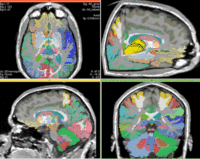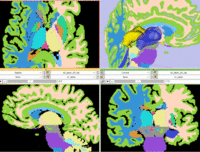Projects:RegistrationLibrary:RegLib C11
From NAMIC Wiki
(Redirected from Projects:RegistrationDocumentation:RegLib 11 AtlasThalamicLabelMerge)
Home < Projects:RegistrationDocumentation:RegLib 11 AtlasThalamicLabelMergev3.6.1
Back to ARRA main page
Back to Registration main page
Back to Registration Use-case Inventory
v3.6.1 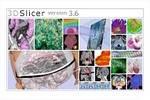 Slicer Registration Library Case #11:
Slicer Registration Library Case #11:
Co-registration of two anatomic brain atlases for merging of structure labels
Input
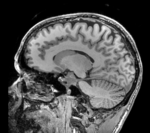
|
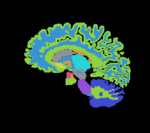
|
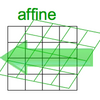
|
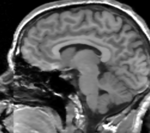
|
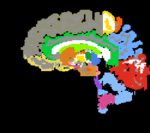
|
| Target Atlas T1 | Target Atlas Labelmap | Moving Atlas T1 | Moving Atlas Labelmap |
Modules
'Slicer 3.6.1 recommended modules: Surface Registration
Download
- Data
- download entire tutorial package (Original Data, Intermediate Results, Solution, zip file 74 MB)
- download old atlas dataset (MRI+labelmap,thalamic nuclei models, list of labels+names), zip file 5.4 MB)
- download new atlas dataset (MRI T1+T2, labelmap, thalamus model), zip file 126MB)
- download result merged new atlas dataset (MRI T1+T2, new merged labelmaps (2x) incl. thalamic nuclei, colormap file with label names), zip file 132 MB)
- download resampled atlas dataset (T1 only resampled to 1mm isotropic, padded to 256 , labelmap reoriented as sagittal), zip file 9 MB)
- Documentation
Objective / Background
This is an example of inter-subject registration via surface matching. The structures of interest are a small subset of the entire image, hence registration is not driven by image intensities but rather two model surfaces derived from the labelmaps.
Keywords
MRI, brain, head, inter-subject, atlas to atlas, surface-based registration, thalamic nuclei
Input Data
- fixed : T1w coronal, 1mm isotropic. Called A1_gray; 1mm isotropic, 256 x 256 x 256
- fixed : labelmap , aligned with above. Called A1_label; 1mm isotropic, 256 x 256 x 256
- moving: T1w coronal, 0.9 inplane, 1.5mm coronal slices. Called A0_gray; 0.9375 x 0.9375 x 1.5mm isotropic, 256 x 256 x 159
- moving: labelmap , aligned with above. Called A0_label; 0.9375 x 0.9375 x 1.5mm isotropic, 256 x 256 x 159
Methods
- Visualize & browse A0 data: determine label range of thalamic nuclei labels in A0_label: 500-526
- Visualize & browse A1 data: determine label range of thalamus lables in A1_label: 10 and 49
- Build label mask of thalamus for A0: Editor module
- Create Labelmap From”: A0_labels
- Select Labelmap to Edit: select the newly created “A0_labels-label” and then select “Rename”. Rename the new volume to A0_thalamus
- From the icon panel, select the “Threshold Icon”
- Threshold range: enter 500 and 526
- change A1_labels: change label 10 to 49; Editor module
- Select Labelmap to Edit: Aa_labels
- Label field: enter 49
- Change Island Icon; left click on area with left thalamus label 10
- Build label mask of thalamus for A1: Editor module
- Create Labelmap From”: A1_labels
- Select Labelmap to Edit: select the newly created “A1_labels-label” and then select “Rename”. Rename the new volume to A1_thalamus
- From the icon panel, select the “Threshold Icon”
- Threshold range: enter 49 and 49
- Smooth A1 thalamus labelmap: Filtering / Denoising / Median Filter
- Neighborhood Size: (default) 1,1,1
- Input Volume: A1_thalamus
- Output Volume: A1_thalamus
- Build thalamus surface model of A0: Model Maker module
- Input Volume: A0_thalamus
- Model Name: A0_ThalamusModel
- Labels: 1
- Smooth: 50
- Decimate: 0.25
- Split Normals: no
- Point Normals: yes
- Save Intermediate Models: no
- Build thalamus surface model of A1 (Model Maker module as above, with A1_thalamus as input and A1_ThalamusModel as output.
- Co-register thalamus surfaces: Python Surface ICP Registration module. Settings:
- Landmark transform mode: Affine
- Mean Distance Mode: RMS
- Maximum Number of Iterations: 500
- Maximum Nmber of Landmarks: 200
- Start by matching centroids: yes
- maximum mean distance: 0.01
- Initial Transform: none
- Input Surface: A0_ThalamusModel
- Target Surface: A1_ThalamusModel
- Output Surface: none
- Output Transform: Xform_A0Affine_ICP
- Apply Registration Xform to labelmap: Resample Scalar/Vector/DWI Volume module. Settings:
- Input Volume : A0_labels
- Reference Volume : A1_labels
- Output Volume : “Create New Volume”, rename to “A0_labels_aff”
- Transform Node: Xform_A0Affine_ICP
- Interpolation Type: “nn”
- Change datatype of new volume A0_labels_aff to labelmap (Volumes module)
- Apply Registration Xform to thalamus mask: Resample Scalar/Vector/DWI Volume module. Settings:
- Input Volume : A0_thalamus
- Reference Volume : A1_labels
- Output Volume : “Create New Volume”, rename to A0_thalamus_aff
- Transform Node: Xform_A0Affine_ICP
- Interpolation Type: “nn”
- Change datatype of new volume A0_labels_aff to labelmap (Volumes module)
- Mask new labelmap with A0_thalamus_aff: Mask Image module
- Input Volume : A0_labels_aff
- Mask Volume : A0_thalamus_aff
- Masked Volume: A0_labels aff
- Mask new labelmap with A1_thalamus: Mask Image module
- Input Volume : A0_labels_aff
- Mask Volume : A1_thalamus_aff
- Masked Volume: New volume, rename to: A0_labels aff_clip
- Typecast A1_labelmap: Cast Image module
- Input Volume: A1_label
- Output Volume: A1_label
- Output Type: “short”
- Merge Labelmaps:Image Label Combine module
- Input Label Map A: A0_label_aff_clip
- Input Label Map B: A1_labels
- Output Label Map: “Create New Volume”, rename to A1_labels_merged
- First label overwrites second: yes
Registration Results
Discussion: Registration Challenges
- Because the structures of interest are a very small subset of the image without distinct grayscale contrast
- the two atlases represent different anatomies and hence some residual misalignment is inevitable
- the two labelmaps have different resolutions and different smoothness of structure outlines. Some need filtering to remove spurious surface details that would distract the registration algorithm
Discussion: Key Strategies
- Because the structures of interest are a very small subset of the image without distinct grayscale contrast, we co-register surfaces rather than intensity volumes
Acknowledgments
- dataset provided by Ron Kikinis, M.D. and Florin Talos, M.D.
